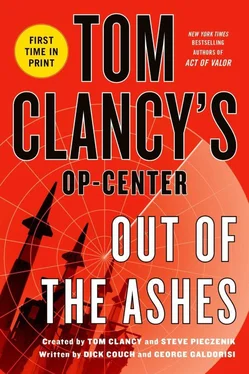Williams paused to carefully frame his words. “Sir, some things can be anticipated in advance, others not. They have to be defined in practice. Like William Calley’s platoon sergeant, I was given an order to kill civilians — a large number of civilians. Not without some serious consideration, I felt was the order was unlawful. I did what was required in such situations. I first respectfully and privately pointed out that this was, in fact, an unlawful order. I then tried to get the order rescinded. When that was unsuccessful, I had but one option: I refused, openly and respectfully, to carry out the order.”
“And that’s why you’re being as blunt as you are in this office, especially with my national security advisor?”
“I don’t intend to be blunt, Mr. President. I’m respectful of your office and of the tough job your national security advisor has. But, Mr. President, if I may be direct.”
“By all means.”
“What happened to me notwithstanding, the U.S. military has centuries of tradition. It also has an enormous body of directives spelling out roles and responsibilities, command relationships, statutory and regulatory rules, and authorities laid out in the U.S. Code and military regulations. Other than on the battlefield, there is little that is opaque.”
“Yes, I’m following you, Admiral. I’ve learned a great deal about the military as commander in chief.”
Chase Williams couldn’t miss the fact that the president was sounding a bit wounded. He softened his tone. “I know you have, Mr. President. As an outsider looking in, it appears to me you have a strong and professional working relationship with our military leadership. And I would offer that part of what makes that all work are the clear-cut roles and responsibilities I just mentioned. So all I’m saying, Mr. President, is that before you and I embark on a mission to reconstitute Op-Center, the most important thing we need to do is to clarify our relationship, even to the point of where we may find ourselves in disagreement.”
“In protecting our nation, we may have to kill people. There may be collateral damage and unintended consequences to our actions. There will always be three considerations on the table. The first is the safety of America — the mission. The second is the lives of innocents and those affected if and when we take action. And, finally, the lives of those who will go into harm’s way in our service. Regarding the role of Op-Center, you and I, Mr. President, will be responsible for balancing those three things within the bounds of our duty, our judgment, and the constraints of the Constitution.”
In that instant, President Midkiff knew what Paul Hood had known all along. This was the right man for the job. Williams’s reference to “when we take action” and “our duty” were not lost on him. He and Chase Williams were entering a partnership and a course of action that was at once dangerous, uncertain, and necessary. The president also now knew what Paul Hood had meant when he had talked about trust.
Midkiff exhaled deeply. “Admiral, I understand and I agree. We should have no confusion regarding what I expect of you, what you expect of me, and what we both expect of Op-Center. I know we’ll have further discussions like this, but if we move forward with this understanding, then I think we can both carry out our duties.”
Without conscious thought, both men extended their hands. Their eyes met as each gripped the other’s hand firmly.
After a comfortable silence, Williams spoke first. “Thank you, Mr. President. I appreciate your understanding and your confidence. With your permission, I do have one remaining order of business.”
“Yes?”
“I don’t need anything in writing, although I suspect there are others who will. So I’ll leave that to you. What I’d like from you is a simple statement of what you want me to do. What is your command guidance, or, as my Army and Marine Corps colleagues would say, what is the commander’s intent?”
Midkiff could now answer without hesitation. “Admiral, I want you to lead Op-Center, and I want you to be single-minded in your devotion to protecting this nation and its citizens. I can’t put it more plainly than that. And as you stated, you will report directly to me.”
“Very well, Mr. President. Is there anything else?” Williams asked with just a touch of finality in his voice.
Wyatt Midkiff paused to study the man. Is it really that simple for him? he found himself thinking. Protect the nation. No agenda. No maneuvering. No power play . For the president, it was rare in his political experience. It was, Midkiff reflected, most refreshing. “There is just one thing, Admiral. Will there be a role for Paul Hood in your organization?”
“When Paul first sought me out for this role, I asked him if he would be willing to serve as a consultant. He has assured me he would, as long as”—here Williams permitted himself a slight smile—“it was as an unpaid consultant. He has also made me fully aware of his condition, and we both feel it should not prevent him, at least for now, from serving in that capacity.”
Midkiff nodded. “How long will it take you to get Op-Center up and running?”
“Mr. President, I would like to give you a definitive answer right now, but I do need to study this and get back to you. Can you allow me four to six weeks to give this the care and attention it deserves? Then I can give you a plan and the way ahead.”
“That’s more than fair, Admiral,” the president said as he rose. “Let’s invite the others back in. They’ve been standing out there, no doubt keeping my secretary from doing her work.”
Harward and Hood were anticipating the president would evaluate Williams and agree to consider him to lead Op-Center. Both were surprised when the president himself pulled open the door to the Oval Office and said, “Gentlemen, meet the new Op-Center director. Let’s get to work.”
Capitol Hill, Washington, D.C.
(December 2, 0815 Eastern Standard Time)
It had been three weeks since the NFL stadium attacks, and the nation was slowly returning to normalcy. In the wake of the president’s ineffective news conference, the White House had worked tirelessly, and with some success, to put the nation at ease. The run-up to the Thanksgiving holiday helped. Americans can stay away from the malls only so long, and the retailers began to welcome the Christmas shoppers. If there was any beneficiary of the attacks, it was online merchants. A great many Americans still felt safest in their homes. Enhanced security at places where the public gathered was having a positive impact. The NBA was moving forward with its season, and the NFL had reached a tentative decision to resume the season this month, but with greater visible security at its stadiums.
On Capitol Hill, Congress continued the inevitable hunt for the guilty. The administration controlled neither house of Congress, and it was open season on the president’s national security leadership. Top leaders from the intelligence community, Defense, State, Homeland Security, and Justice were called before a wide array of committees, thoroughly grilled, and sent away to “clean things up.” Then, with the committee leaders’ posturing complete, as suddenly as they had begun, the hearings played themselves out. While the nation and Congress were moving on, the executive branch remained on point with a single message: This would not happen again.
* * *
Three hundred miles south-southwest of Capitol Hill, two men were focused on their mission and on their men. Major Michael Volner, United States Army, and Master Gunnery Sergeant Charles Moore, United States Marine Corps, had been together for close to three years. Volner was young for a major and old for a troop commander at the Joint Special Operations Command. Moore was a seasoned veteran of indeterminable age. Volner came to JSOC from the 75th Rangers; Moore from the Marine Corps Special Operations Command. The two stood together on the catwalk of one of the shoot houses at Fort Bragg, North Carolina.
Читать дальше












